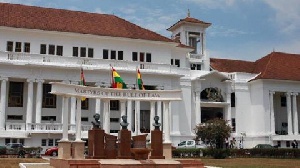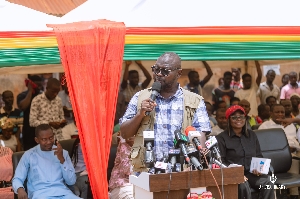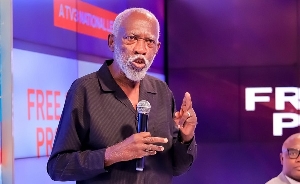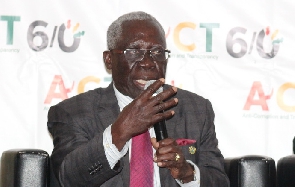The recent decision of the Supreme Court in the case of Professor Stephen Asare v The Attorney General & The General Legal Council seems to be another victory for Ghana's legal system. It is more evidence that Ghana has taken yet another step towards the achievement of rule of law.
But the question is: despite the victory by Ghana's legal system, have the students, for whose interest I presume the legal suit was brought, won anything? Is there really anything to jubilate about?
This piece seeks to bring up some few questions which seem to be the fear of most law students following the decision of the court. Students are in Wonderland trying to guess what the next move of the GLC (General Legal Council) will be.
A close look at the court's decision reveals that the court never expressed a dislike for the procedure adopted by the GLC in admitting students into the Law School but only disliked the fact that it was done without any legal backing.
Hence, should the GLC draft a legislative instrument (LI) legalizing the entrance examination and interview procedure which manages to lie in Parliament for 21 sitting days without annulment by Parliament; wherein lies the victory? Is there any reason to jubilate? The only hope left for us is to turn to our Bibles and Qur'ans and pray that Our Dear Lord touches the hearts of our parliamentarians to annul any LI from the Council seeking to legalize the entrance exam and interview process.
It's very disheartening to see how the fate of students after a long tiring and expensive 4 year stay in a university will be determined by one or two hours' standardized examination and few meager minutes' interviewing time. We all know what goes into exam and most especially the interview.
Students are mostly even asked non law related questions and other surprising questions during the interview section. This process can deny the very best students from graduating into the capable lawyer Ghana is looking for. I can't say I would ever wish this process back into existence.
Now, another interesting point that came up in the judgement was the introduction of the quota system. This system prima facie seems to be the only practical and reliable solution to the situation at hand. But it also comes with its own issues.
Should the quota system be adopted, what will be the fate of the already existing law students (those in second, third and final year)?
What will be the fate of those already holding the LLB degree who have not yet gotten admission into the Law School? Are they supposed to get back to the universities so as to fit into the quota system? Or will they be given their own slot?
As it is, a wholesale graduation from the faculty to the Law School without any quota as of now will not be possible or will not be a good idea. The issue of facilities, resources, lecturers and others come into play.
This issue was raised by Retired Justice Brobbey when he gave a speech in a legal mentorship programme held by the Kwame Nkrumah University of Scoence and Technology (KNUST) during the celebration of their law week in 2016. But even so, at least now we have almost 12 faculties of Law in Ghana.
Let us assume each of them have at least 100 students graduating each year, it means every year 1200 students will be produced for admission into the law school on the average and 1200 will be leaving the law school every year, all other things been equal.
Another question is: is Ghana ready to accommodate 1200 lawyers every year without compromising on quality? Let us not forget we are Africans, once the universities get to know of this whole sale promotion, they will increase the intake of students for the LLB program even more and we will get back to this same problem a few years to come.
People are quick to say, "Ghana's population is 27 million, so YES we can accommodate those number of lawyers every year". But they forget that out of this 27 million, some are already lawyers, others are judges, some are children (children can go to court but cannot take care of the expenses involved, that responsibility is shifted on someone), some are old men and women not capable of affording lawyers.
Others are mentally ill, most are in the deep rural areas where nothing on this earth will cause them to go in for the services of a lawyer. Even if they will, most cannot afford it. Attention now, when talking of Ghana's population in relation to this issue should be on the working population who can afford the services of a lawyer. Another issue is, how deep is the knowledge, believe and love of the ordinary Ghanaian for the rule of law to warrant a comparison of ourselves with the likes of UK and the US?
Undoubtedly, Ghana needs lawyers but should this need for lawyers cause us to make such whole sale promotion? Quality and not quantity is what Ghana needs.
But surely, there is a way out of this dilemma. One solution in my opinion is the expansion of the facilities of the School of Law. For this reason, the pressure should be shifted from the GLC to the government to make provisions for the facilities. I guess provision of educational facilities is part of the functions of the government. But then again, it takes us back to the question of whether Ghana is really ready to accommodate an average of 1200 lawyers every year.
Let us keep our fingers crossed as we await what will happen after the 6 months ultimatum given to the GLC. The GLC ought to come up with a solution which I believe they will. However, that should never be the examination and the interview process. How on earth should about nine courses be combined in a single paper for one to answer? Obviously this is not the best way to go about choosing people to be admitted into the law school.
The quota system is the best way out for now despite the problems that come with it. At least that will force the universities to stop feeding on our ignorance and admitting so many people into their faculties, knowing perfectly that such a problem awaits us. I do not even understand why the pressure is not given to the universities to limit their intake of students but rather it is centered on the GLC to find a solution to a problem they were not the cause.
In my candid opinion, although the decision proposed a solution, it did not actually solve anything. It has only awakened anxiety in the students and given a wide range of options to the GLC - of which none will bring any smile on the face of the those yet to enter the law school as was expected.
The good Lord is our helper.













